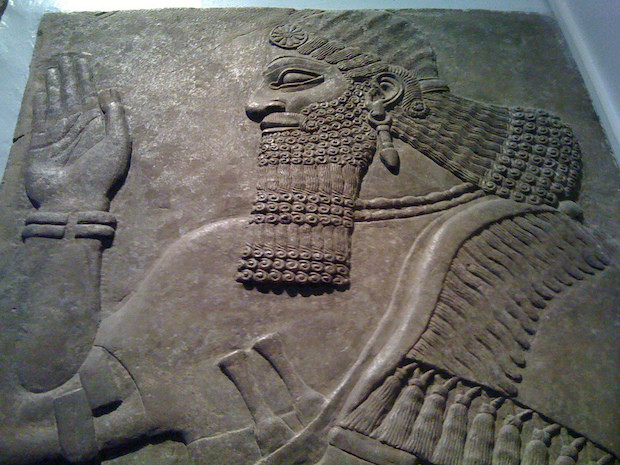You have no items in your cart. Want to get some nice things?
Go shopping

I’m sure none of us think it acceptable to disregard or disrespect a culture simply because we don’t agree with it or even understand it, yet we do this regularly. Our forfeiting of understanding to be replaced by stereotypes and misconceptions relays that worldwide we lack respect for cultures foreign to our own and we believe ourselves superior to them, creating barriers and highlighting differences between cultures. Islamic State has been proudly destroying cultural sites, posting pictures for the world to see and despair over. What do we actually think of its actions? What springs instantly to my mind is that I find its actions ignorant, but can we honestly believe that we are any more respectful of culture than they are? We similarly disrespect Muslims, cowardly believing all Muslims are terrorists. Our warped views regarding cultural differences are leading to severe prejudicial issues. There is barely any empathy, no attempts to see things from a new perspective that doesn’t involve fear or hatred. We don’t seem to want to exercise trust or compassion, instead we want to feel secure ourselves.
From Islamic State’s point of view, it is solving a huge problem, the problem of an overindulgent capitalist Western society. It is trying to better the world through its own agenda, by teaching the rest of the world lessons through violence and forwarding its belief that its extremist views are valid and right. In destroying important buildings it aims to assert its power and its capability to harm and to rule. Obviously the destroying and defacing of cultural sites demonstrates a devastating lack of disrespect for culture and heritage, but it falls deeper than this; it also shows a deep hatred of the cultures that it is attempting to destroy. As of yet, a few of the recent cultural sites Islamic State has ruined are the ancient Assyrian church of Tikrit and city of Nimrud, Iraqi cities Khorsabad and Hatra, the burial site of Prophet Younis in Mosul, Syria’s Armenian Genocide Memorial Church, a statue of the ancient king of Hatra, as well as the city of Hatra.
The purposeful attempt at extinguishing a culture, ‘cultural cleansing,’ features highly in Islamic State’s attacks. It proudly shares its sheer lack of respect and its distaste of others to the world online. We spoke to the British Museum, who sent us this statement regarding the ruination of cultural heritage in Syria and Iraq, “We are very deeply concerned with what is happening in the region with regard to its cultural heritage, whether it is destruction of archaeological sites, museums and religious monuments or the looting and trafficking of antiquities. We are involved as much as we possibly can through monitoring the situation from afar.”
If we compare the West’s dealing with Islamic State from afar, we can see that although we aren’t as militant or as extreme as Islamic State, we do oppress cultures that are different to our own. Understandably, perhaps due to the media’s insistence that all terrorists are Muslims, upon hearing the word ‘terrorist’ younger generations conjure a particular image in their mind, a Muslim image. The damaging stereotypes we hear follow us and are ingrained in everyday life. We sit on the tube, see a beard and automatically think, ‘this is it.’ We see any item of traditional clothing that is foreign to our own and think, ‘look for any suspicious packages.’ It is comprehensible, as humans we naturally fear what we don’t understand or know, and we haven’t been taught enough about Muslim culture and beliefs to understand or appreciate its value in society.
Our tendency to assume that all terrorists are Muslim, and vice versa, was exposed in the government’s counter-radicalisation strategy ‘PREVENT.’ In July 280 academics, lawyers and public figures spoke out against the strategy in an open letter, calling out the serious typecasting of Muslims. What caught my eye in this letter was section three, “PREVENT remains fixated on ideology as the primary driver of terrorism. Inevitably, this has meant a focus on religious interaction and Islamic symbolism to assess radicalisation. For example, growing a beard, wearing a hijab or mixing with those who believe Islam has a comprehensive political philosophy are key markers used to identify ‘potential’ terrorism. This serves to reinforce a prejudicial worldview that perceives Islam to be a retrograde and oppressive religion that threatens the West. PREVENT reinforces an ‘us’ and ‘them’ view of the world, divides communities, and sows mistrust of Muslims.” In encouraging ignorant stereotyping, the government sets apart Muslims from the community, and does nothing to help us to understand their culture, beliefs or views. What interested me in this was the idea of threat to the West. Purely because we don’t know enough about Islam, we fear it and try to oppress it, as the West claims Islam does to its followers. Labelling Islam retrograde merely shows our ignorance and defiance to believe there can exist ways of life that are different to our own. The use of stereotypes further encourages separation and relays the severity of our misunderstanding.
It is not justifiable to hurt or destroy a culture physically or mentally, it’s incomprehensible that people consider it acceptable. Are we not all allowed to hold beliefs? Each individual deserves more respect than they are getting. The judgment that comes hand in hand with disregard for cultures is wrong. Although we can’t change the ways of Islamic State, we can change our own preconceived ideas and practice opening our minds instead of creating discriminatory strategies that target one broad stereotype. We all know that any form of disregard or disrespect for a culture is wrong, so why continue?

About Isabel Gonzalez-Prendergast
Isabel is particularly interested in international literature, learning about different cultures and philosophies.




